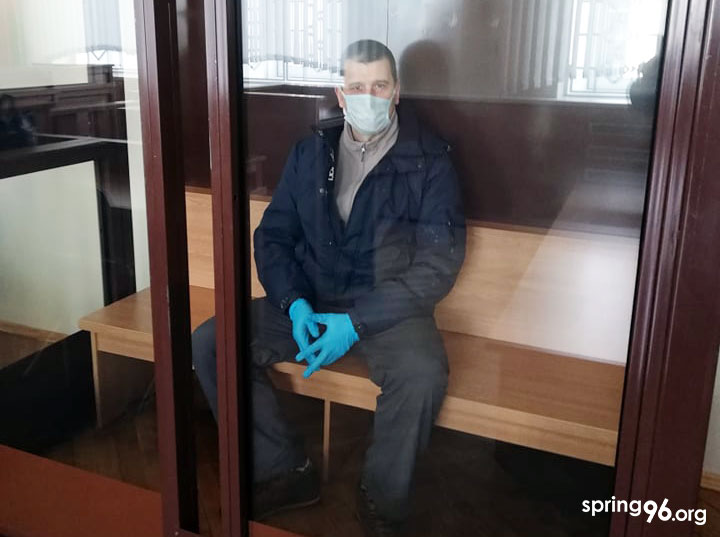
On February 12, the Kastryčnicki District Court of Hrodna sentenced Vasil Pilets to one year of restricted freedom (home confinement) for hooliganism against Volha Bondarava and Aliaksandr Halakhau, activists of a pro-government community group. Following an appeal filed by Deputy Prosecutor of Hrodna Dzmitry Antanovich, the Board for Criminal Cases of the Hrodna Regional Court replaced the sentence with one year’s imprisonment in an open penitentiary. The verdict was final, and Vasil Pilets was sent to serve his sentence.
We believe that the criminal case is a clear example of a selective and discriminatory approach of the prosecution and the court to the initiation and consideration of criminal cases against dissidents.
The court found that Vasil Pilets used violence against the victims, who painted over an image of the white-red-white flag on the asphalt. By doing this, according to the Deputy Prosecutor of Hrodna, they “performed their public duty to restore order.”
The court arbitrarily assessed the evidence presented to it and rendered a verdict contrary to the evidence established during the examination of the case file.
The case file included surveillance camera video footage, which confirmed the circumstances of the conflict, as claimed by the defendant, who plead not guilty. Contrary to this evidence, the court found that the defendant had committed a number of illegal acts against the victim Bandarava in the same place immediately after the self-defense actions recorded on video, solely on the basis of the victims’ testimonies, which contradicted other case material.
The motives of the defendant’s actions were established by the court arbitrarily, without taking into account the circumstances of the case and the personal characteristics of the parties to the conflict. The position of the accused, according to which his behavior was dictated by the nature of the victims’ actions and did not go beyond restraint, was not refuted by acceptable evidence. The defendant did not inflict any damage or used any other methods aimed at inflicting pain, suffocation and humiliation of the opponents. This, together with the absence of any traces of violence against the victims, refutes the arbitrarily established fact of Pilets’s beating Halakhau and chocking Bondarava.
The court qualified the actions of Vasil Pilets under Part 1 of Art. 339 of the Criminal Code on the grounds of his allegedly committing acts that grossly violated public order and showed flagrant disrespect for society, accompanied by the use of violence. The court’s conclusion that violence against Halakhau and Bondarava was used to grossly disturb public order and express obvious disrespect for society is erroneous. In the absence of a hooliganism motive, Vasil Pilets’s actions against Halakhau were not a crime or an administrative offense, while the defendant did not commit any acts against Bondarava.
In these circumstances, we conclude that the application of domestic law in the case of Vasil Pilets and the assessment of the facts and evidence were clearly arbitrary and resulted in an apparent error, in which the court violated its obligation of independence and impartiality.
The content of the prosecutor’s appeal reaffirmed our opinion on the politically motivated nature of the persecution of Vasil Pilets, and the selection of a harsher punishment involving a term of imprisonment (restricted freedom in an open penitentiary meets the criteria of “imprisonment”) is not substantiated by grounds acceptable in a democratic society, as it significantly arbitrarily worsens his position compared to other convicts in a similar situation without a political motive.
According to the Guidelines on the Definition of Political Prisoners, a person deprived of liberty is to be regarded as a political prisoner, if at least one of the following criteria is observed:
a) the detention has been imposed in violation of the right to a fair trial, other rights and freedoms guaranteed by the International Covenant on Civil and Political Rights or the European Convention for the Protection of Human Rights and Fundamental Freedoms;
b) the detention was based on falsification of evidence of the alleged offence, or imposed in the absence of the event or elements of the offence, or imposed in connection with an offence committed by another person.
We, representatives of the Belarusian human rights community, declare that the persecution of Vasil Pilets is politically motivated and we will therefore consider him a political prisoner.
In this regard, we, representatives of Belarusian human rights organizations, call on the Belarusian authorities to:
- review the sentence handed down to Vasil Pilets, respecting the defendant’s right to a fair trial and eliminating the factors that influenced the initial verdict;
- release Vasil Pilets and select other measures to ensure his appearance in court, given the lack of grounds for the application of pre-trial detention.
Human Rights Center "Viasna"
Legal Initiative
FORB Initiative
Human Constanta
Belarusian Helsinki Committee
Center for Legal Transformation (Lawtrend)
PEN Belarus
Belarusian Documentation Center




